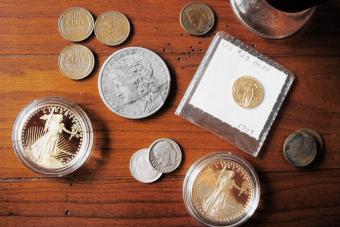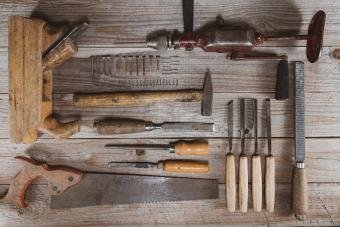
Have you ever wondered about the value of old pennies mixed in with your spare change? Maybe you have an old jar of coins given to you from an older relative or you received several old pennies in your change at the grocery store. Either way, understanding how to identify a potentially valuable old penny will keep you from tossing away something that is worth far more than a single cent.
How Old and Rare Is Your Penny?
There are several factors that can make an old penny valuable. Two of the most important are the rarity and the age. Older coins are often worth more. Fortunately, when it comes to dating pennies, the process is simple. The date is printed right on it! You can also tell by the size and design, which changed over the years.
The Oldest Penny - Flowing Hair Chain
When you think of old pennies, do you think of pennies designed with the Lincoln Memorial, or older Wheat or Indian Head pennies? Pennies of this type are examples of small cents. For 64 years before the small cents were minted, the United States Federal Government struck penny coins known as large cents. Large cent coins are made of copper and are about the same size of a current $1 coin. The first large penny coin was the Flowing Hair Chain. The Flowing Hair Chain penny features a head that represents Liberty on one side. On the other side, there's a linked chain.
- The penny existed in this form for a single year: 1793.
- This was the first circulating coin minted by the United States Mint.
- There are only 36,103 examples of this coin in existence, and it is highly valued by collectors.
- The auction record for the Flowing Hair Chain penny is $1.5 million, set in January of 2019.
Other Large Cents - 1793-1856
After the Flowing Hair style of large cent was discontinued, the penny went through a variety of design changes while still retaining its large size. The following are some of the most notable:
- The Liberty Cap was introduced later in 1793 with an image of Lady Liberty shows her wearing a modest cap over part of her hair. In uncirculated condition, they can be worth thousands of dollars.
- The Draped Bust Cent came next. This style featured Lady Liberty with her hair pulled back and the hint of a dress at her bust. There were a number of numismatic errors in the striking of this coin, which can add to the value. Rare mistakes and beautiful coins of this style sometimes sell for thousands.
- The Coronet Head Cent is another notable large cent with many errors. From 1816 through 1839, the Philadelphia Mint struck 51,706,473 coins in this style. Even today, these coins are fairly common, but errors and unique attributes can increase value.

Small Cents - 1856-Present Day
There was a lot of copper in the large cents, and the coins were worth less than their metal value by the 1850s. In 1857, the mint changed the metal content to 88% copper and 12% nickel and made the coins smaller. A pattern coin or prototype was created in 1856. Only 1400 of this coin were made, and they were not intended for release to the public. After being shown to certain members of Congress, the coins were to be returned to the mint and destroyed. However, not all of the coins were returned, and those that were not destroyed are extremely valuable today. Depending on the condition, these old pennies are valued from $6,700-$150,000. This pattern coin was followed by several other small cent styles:
- The Flying Eagle one-cent coins were minted for release in 1857-1858 and produced in record numbers. They featured an eagle in mid-flight. Because millions of them entered circulation, they are not as valuable as some other coins. Even in uncirculated condition, they only fetch a few hundred dollars.
- Minted from 1859-1909, the Indian Head penny is a design of Lady Liberty wearing a headdress of feathers. Value varies with this coin. Hobbizine provides a chart with approximate values of Indian Head pennies.
- The first Lincoln pennies were struck in 1909 and have undergone several major changes over the years. From 1909 through 1958, they featured a wheat design on the back. After that time, they feature the familiar image of the Lincoln Memorial. Value depends on condition and rarity, according to CoinTrackers.
What Is the Condition of Your Penny?
While age and rarity are important for value, condition can have just as much impact. Examine your penny carefully using a magnifying glass and note the condition. According to the Numismatic Guaranty Corporation (NSG), which specializes in collectible coin grading, these are some things to look at when assessing the condition of an old penny.
Visibility of Details
Look at the details of the design with a magnifying glass. In mint or uncirculated condition, a penny will have crisp, fine details and not distressing. An extremely fine condition coin will have wear on the highest points of the design, while a very fine condition coin will have wear across the entire design. In fine condition, you can still read the letters and numbers, but the details are getting soft. A coin in poor condition has only enough detail to recognize that it's a penny.
Color
The color of your penny is also a factor in its condition. A penny that's still red is the most desirable, while brown or green coins are worth less. Note that you can polish copper, but doing so can remove some of the detail of the coin.

Compare Your Penny to Recently Sold Examples
When you've inspected your penny and gathered as much information as possible about it, it's time to compare it to recently sold examples. You can look up recent sales on Professional Coin Grading Services (PCGS), but another great resource is eBay. Look at sold pennies only, not pennies that are currently listed for sale. These are a few examples:
- A Coronet Head Cent from 1821 in uncirculated condition sold for over $20,000 in late 2019.
- An uncirculated double-die Lincoln penny from 1955 featuring a mistake in the stamping sold for $7,500 in early 2020.
- Despite being older than either of the other two examples, a 1794 Liberty Cap with heavy corrosion sold for only about $370 in late 2019.
Fun and Exciting Part of US History
Understanding how to evaluate old pennies can help you assign value to coins you inherit or collect. It's also fun just to learn about United States coin history and the important factors affecting how much pennies are worth. For more fun with coin collecting, learn about 1943 steel penny values.







